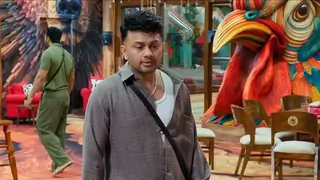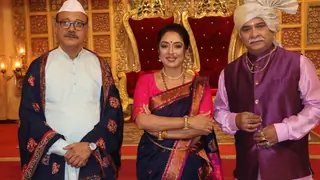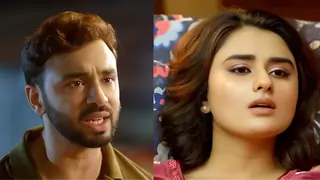Interview by Santanu Bhattacherjee
Jazz guitar legend John McLaughlin has recently released an educational box-set about improvisation called This is the Way I Do It. We interviewed McLaughlin exclusively.
John McLaughlin, quite simply, is an eloquent. A guitarist whose musical vocabulary is both fluent and succinct; a musician who has proved he can work on equal terms with players from around the world and in any context. The language of music has rarely been expressed better.
He is also the guitar hero's guitar hero; admired by Johnny Marr, Jeff Beck and Robert Fripp amongst many others – there are very few serious guitar players who cannot have been influenced by his virtuoso technique. John is currently recording a new album, with a group of invited musicians, which will incorporate ideas from Asian underground music that originated here in the U.K.
"Asian music and culture have played a pivotal role in my life, whether from a musical or philosophical/spiritual viewpoint. About 12-15 years ago, Jungle music appeared and coincided with a very strong retrospective movement in Jazz. I was never a fan of retrospective music, and I became intrigued by Jungle only to find out that it had its roots in Jazz-Rock, Reggae and Indian music. Drum 'n Bass is a derivative of Jungle, but for my ears Jungle is more unpredictable and consequently more enjoyable.
"Asian Dub Foundation, Nitin Sawhney, and Talvin Singh have experimented with either Jungle or Drum 'n Bass, and in addition have introduced a vast array of Indian percussion with it and Indian vocalists. I've even heard Shakti influences in some of their recordings.
"Some of the recordings they have done are very interesting from the conceptual point of view, and the sometimes very tasteful use of synthesizers.
"With these artists, there are some really interesting groups such as D Note and Lemon D, who have also made some excellent recordings.
"Now while the music might not be as 'rich' as jazz music, for me, some of them are more interesting musically.
"The other aspect of 'Underground' is the world we live in, insofar as it is now extremely industrialised. We live surrounded by the sound of industry, and my idea is to incorporate this 'industrial music' into new forms of music. That's the tricky part. The other part is putting together some of the world's finest musicians, from East and West, and placing them in a musical situation where their particular musical conventions might not work. In other words it makes them think in different ways, and then putting all of this together."
Born in Yorkshire on January the 4th 1942, John McLaughlin grew up in a musical family but was essentially self-taught as a guitarist and took on various influences from blues, flamenco, jazz and classical music. His love of music informed his dedication and has led him to being one of the foremost talents in the world today.
"On my iPod I have a selection from:- Miles (early & late period), Coltrane (early & late period), Bill Evans, Charles Lloyd, Cannonball Adderly, Joshua Redman, Brad Meldhau, Sly and the Family Stone, D Note, Lemon D and other UK 'underground' groups, Bluth, Gonzalo Rubalcaba, Nusrat Fateh Ali Khan, Vinnie Colaiuta, Massive Attack. The list is endless."
He emerged publicly during the British blues revival of the Sixties, featuring in bands such as Georgie Fame and the Blue Flames and the Graham Bond Organisation, before cementing his reputation in avant-garde jazz with the similarly brilliant John Surman and Dave Holland. Drumming legend, Tony Williams picked John to play in his group Lifetime, with Jack Bruce and Larry Young,  after hearing a tape of his playing and soon after Miles Davis came a' calling. Miles was moving into his Jazz-Fusion period and was sweeping up the cream of young musical talent to join him; even though Miles risked alienating Tony Williams, a man he respected and admired, by asking John to join him on the recording of In A Silent Way, his move was vindicated by John's beautiful, soulful playing on what has now become a landmark recording. John continued to perform with Williams and Davis but soon formed his own band, The Mahavishnu Orchestra, playing jazz-rock fusion that was by turns muscular and contemplative. John's career since then has found him in varied musical environments with a succession of dazzlingly accomplished partners from the screaming jazz-rock of his work with Carlos Santana to the exhilarating indo-jazz of Shakti to the exuberant flamenco work-out of his trio guitar work with Paco DeLucia and Al DiMeola. John gives the impression that, like Miles, he never wants to sit on his laurels.
after hearing a tape of his playing and soon after Miles Davis came a' calling. Miles was moving into his Jazz-Fusion period and was sweeping up the cream of young musical talent to join him; even though Miles risked alienating Tony Williams, a man he respected and admired, by asking John to join him on the recording of In A Silent Way, his move was vindicated by John's beautiful, soulful playing on what has now become a landmark recording. John continued to perform with Williams and Davis but soon formed his own band, The Mahavishnu Orchestra, playing jazz-rock fusion that was by turns muscular and contemplative. John's career since then has found him in varied musical environments with a succession of dazzlingly accomplished partners from the screaming jazz-rock of his work with Carlos Santana to the exhilarating indo-jazz of Shakti to the exuberant flamenco work-out of his trio guitar work with Paco DeLucia and Al DiMeola. John gives the impression that, like Miles, he never wants to sit on his laurels.
"My first band was formed while I was still at school. After that I became a kind of permanent side-man until 1970. I had just played a gig with Miles and we were speaking together in the band room. All of a sudden he said 'John, now's the time to form your own band'. Since he was the most honest man I'd ever met, and my hero since the age of 15, I had to justify his faith in me, even though at that time I didn't feel ready to be a leader. Since then I haven't stopped. As far as 'feeling comfortable' is concerned, I love all great musicians and great music wherever they may come from so I'm delighted to play with Spanish, Indian, Western musicians, whatever. However, in a way I am against being 'comfortable' in music. I need to be provoked in music, and of course I also provoke in my turn. For me, it is somewhat dangerous to be too comfortable in music. Human nature quickly becomes indolent."
The list of partners that John has chosen to collaborate with has been a catalogue of the world's best and most innovative artists: Billy Cobham, Jerry Goodman, Zakir Hussain, L. Shankar, Hariprasad Chaurasia, Jan Gabarek, Trilok Gurtu, Kai Eckhardt, Joey DeFrancesco as well as the aforementioned Carlos Santana, Paco DeLucia and Al DiMeola. Also, John's work as a "side-man" has enabled him to work with the last great Miles-influenced generation of jazz legends (or "Miles' Boys") including Chick Corea, Herbie Hancock, Joe Zawinul, Wayne Shorter, Tony Williams, Dave Holland, Keith Jarrett, Jack DeJohnette, and Airto Moreira.
"Music is a communicative art: firstly amongst the musicians performing, and secondly with the audience. One of my main criticisms of the 'Retrospective' Jazz I spoke about earlier, was the lack of interactionbetween musicians which is to me one of the principal criteria in good Jazz, or good music in general. Jazz and Indian music are essentially collaborative or interactive musics because improvisation plays such an important role - the most important role. What this means is spontaneity, but there's no spontaneity without other humans to be spontaneous with.
"I will never be able to repay my debt to Miles for his 'influence'. Since the age of 15 he has been influencing me in the most marvellous way musically. Being able to play and record with him was critical for me in being able to learn his way of playing and leading, recording, whatever. His way was simply masterly. 'My Goals Beyond' half of which contains several, quite exceptional, acoustic guitar pieces was an exception to what I've just written, but of course, there is always room for the 'solo' artist to produce great works. Since this was the only 'solo' recording I ever made in my life, this is indicative of my interest in solo work."
The work for which John may be most fondly remembered, certainly on the Indian Sub-Continent, is his collaboration with Indian classical maestros who formed the heart of Shakti. John found himself in conversation with the powerhouse talents of L. Shankar, Zakir Hussain, and T.H. Vinayakram (and later, the sublime Hariprasad Chaurasia) and was completely at ease in this exalted company. The Shakti recordings sum up everything that is good about music; the breadth, subtlety and shades of emotion that are contained within are, quite simply, breathtaking. Shakti are the only Indo-jazz fusion group that has gained widespread acceptance in India and is a testament to the universality of the musical language that exists with great musicians and to John's musical honesty that he immersed himself entirely within an idiom that other western musicians find difficult to engage with except on a superficial level.
"My relationship with Asia in general, and India in particular has been very long and until now, a wonderful adventure. My life, and as a consequence, my work also, would be dramatically different without these influences. Actually unthinkable!
"I don't agree entirely that western musicians engage superficially with Indian classical music. Yes it's true that lots of the new 'World Musicians' use the sounds of Asia simply for effect and to add colour. This is unfortunate, but then again, there are lots of people who want to hear this kind of music, whether for ambient sound or otherwise. It's not at all demanding. Joe Harriott was certainly an exception. To say clearly what drew me to Indian music or to Indian culture for that matter, is unknown to me.
"However, from a musical point of view, there is a deep connection between jazz and Indian music. They are the only two schools of developed rhythmic improvisation on the planet. The foundations are different since the western way is harmonic, but since the advent of modal music by the late 1950's (Miles again), and the outstanding work done subsequently by John Coltrane in modal music, we have even more in common.
"My work with Shakti is not to learn how to play Indian music, (though I have studied it seriously for many years), my work with Shakti is simply the desire to play with these absolutely fantastic musicians. I am first and foremost a western musician, but I have benefited in countless ways from my association with these musicians."
John's relationship with Eastern philosophy began in the early 70's, when he became a disciple of Sri Chinmoy Kumar Ghosh (Sri Chinmoy gave John the name Mahavishnu), and John's spirituality can be felt quite clearly in his work. Music has always been able to express emotion with more fecundity and nuance than the spoken word will ever be able to bear or, to put it another way, a jazz musician's job will always be to make a tune sound not like itself but himself. Like Miles, Coltrane, Rollins, Bill Evans and all the other greats too numerous to mention, John expresses a profound emotional resonance and beauty through the notes he plays that is served by his astounding technique rather than enslaved by it; he has never reduced himself to the empty verbosity that technical expertise can engender in less articulate musical linguists.
"We may think that music operates only on the emotional, spiritual and aesthetic levels, but politics and the intellect are there all the time. The reverse is also true insofar as the world's politicians are concerned only with the economic and political ramifications of their actions. As a result, they forget, or are unconscious, of the corrosive influence they have generally on the hearts and minds of people by ignoring these essential aspects of human existence."
John McLaughlin has been at the peak of his creative powers for over 30 years and a generation of guitarists are beholden to him in demonstrating the splendour that lies at the heart of the instrument and an indefatigable spirit that keeps him moving forward.
"There is so much left to do, and I really don't know what keeps me going creatively. Passion???"

























